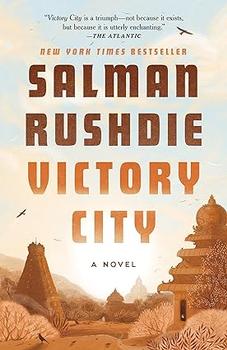Summary | Excerpt | Reviews | Beyond the Book | Readalikes | Genres & Themes | Author Bio

A Novel
by Salman Rushdie
For the rest of her life Pampa Kampana, who shared a name with the river on whose banks all this happened, would carry the scent of her mother's burning flesh in her nostrils. The pyre was made of perfumed sandalwood, and an abundance of cloves and garlic and cumin seeds and sticks of cinnamon had been added to it as if the burning ladies were being prepared as a well-spiced dish to set before the sultan's victorious generals for their gastronomic delight, but those fragrances—¬the turmeric, the big cardamoms, and the little cardamoms too—¬failed to mask the unique, cannibal pungency of women being cooked alive, and made their odor, if anything, even harder to bear. Pampa Kampana never ate meat again, and could not bring herself to remain in any kitchen in which it was being prepared. All such dishes exuded the memory of her mother and when other people ate dead animals Pampa Kampana had to avert her gaze.
Pampa's own father had died young, long before the nameless battle, so her mother was not one of the newly widowed. Arjuna Kampana had died so long ago that Pampa had no memory of his face. All she knew about him was what Radha Kampana had told her, that he had been a kind man, the well-loved potter of the town of Kampili, and that he had encouraged his wife to learn the potter's art as well, so after he died she took over his trade and proved to be more than his equal. Radha, in turn, had guided little Pampa's hands at the potter's wheel and the child was already a skilled thrower of pots and bowls and had learned an important lesson, which was that there was no such thing as men's work. Pampa Kampana had believed that this would be her life, making beautiful things with her mother, side by side at the wheel. But that dream was over now. Her mother had let go of her hand and abandoned her to her fate.
For a long moment Pampa tried to convince herself that her mother was just being sociable and going along with the crowd, because she had always been a woman for whom the friendship of women was of paramount importance. She told herself that the undulating wall of fire was a curtain behind which the ladies had gathered to gossip, and soon they would all walk out of the flames, unharmed, maybe a little scorched, smelling a little of kitchen perfumes, perhaps, but that would pass soon enough. And then Pampa and her mother would go home.
Only when she saw the last slabs of roasted flesh fall away from Radha Kampana's bones to reveal the naked skull did she understand that her childhood was over and from now on she must conduct herself as an adult and never commit her mother's last mistake. She would laugh at death and turn her face toward life. She would not sacrifice her body merely to follow dead men into the afterworld. She would refuse to die young and live, instead, to be impossibly, defiantly old. It was at this point that she received the celestial blessing that would change everything, because this was the moment when the goddess Pampa's voice, as old as Time, started coming out of her nine-year-old mouth.
It was an enormous voice, like the thunder of a high waterfall booming in a valley of sweet echoes. It possessed a music she had never heard before, a melody to which she later gave the name of kindness. She was terrified, of course, but also reassured. This was not a possession by a demon. There was goodness in the voice, and majesty. Radha Kampana had once told her that two of the highest deities of the pantheon had spent the earliest days of their courtship near here, by the angry waters of the rushing river. Perhaps this was the queen of the gods herself, returning in a time of death to the place where her own love had been born. Like the river, Pampa Kampana had been named after the deity—¬"Pampa" was one of the goddess Parvati's local names, and her lover Shiva, the mighty Lord of the Dance himself, had appeared to her here in his local, three-eyed incarnation—¬so it all began to make sense. With a feeling of serene detachment Pampa, the human being, began to listen to the words of Pampa, the goddess, coming out of her mouth. She had no more control over them than a member of the audience has over the monologue of the star, and her career as a prophet and miracle worker began.
Excerpted from Victory City by Salman Rushdie. Copyright © 2023 by Salman Rushdie. All rights reserved. No part of this excerpt may be reproduced or reprinted without permission in writing from the publisher.
Your guide toexceptional books
BookBrowse seeks out and recommends the best in contemporary fiction and nonfiction—books that not only engage and entertain but also deepen our understanding of ourselves and the world around us.